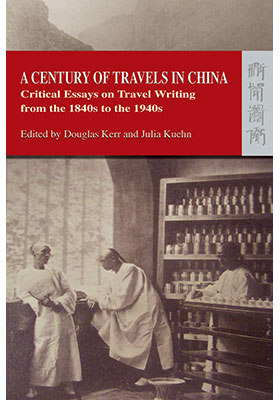A Century of Travels in China
Critical Essays on Travel Writing from the 1840s to the 1940s
(旅遊中國一世紀:評論遊記文章(從19世紀40年代至20世紀40年代))
ISBN : 978-962-209-846-6
May 2007
256 pages, 6″ x 9″, 18 color illus.
- HK$195.00
Ebooks
Writings of travelers have shaped ideas about an evolving China, while preconceived ideas about China also shaped the way they saw the country. A Century of Travels in China explores the impressions of these writers on various themes, from Chinese cities and landscapes to the work of Europeans abroad.
From the time of the first Opium War to the declaration of the People’s Republic, China’s history has been one of extraordinary change and stubborn continuities. At the same time, the country has beguiled, scared and puzzled people in the West. The Victorian public admired and imitated Chinese fashions, in furniture and design, gardens and clothing, while maintaining a generally negative idea of the Chinese empire as pagan, backward and cruel.
In the first half of the twentieth century, the fascination continued. Most foreigners were aware that revolutionary changes were taking place in Chinese politics and society, yet most still knew very little about the country. But what about those few people from the English-speaking world who had first-hand experience of the place? What did they have to say about the “real” China? To answer this question, we have to turn to the travel accounts and memoirs of people who went to see for themselves, during China’s most traumatic century.
While this book represents the work of expert scholars, it is also accessible to non-specialists with an interest in travel writing and China, and care has been taken to explain the critical terms and ideas deployed in the essays from recent scholarship of the travel genre.
“There are now many courses on travel writing at universities around the world. Both teachers and students will find much to illuminate their field in this collection of essays, not least because China, as itself an empire, poses different questions from those answered by Mary Louise Pratt and Edward Said. The reader will find a wide range of studies, from the post-Romantic nature of reminiscences of the Amherst embassy in the context of the opium wars, through the contrasting attitudes of the great and good, such as Lords Elgin and Lugard and the Webbs, to the grassroots eye-view of missionaries in disguise passing as Chinese, reflections on landscape, photography, the reception of Chinese cuisine, on to the Modernist perspectives of W. H. Auden and William Empson and finally to a political redefinition of travel as fellow-traveling in a study of Agnes Smedley’s participation in the Long March. China opened itself in a variety of ways, as well as being ‘opened up,’ long before it joined the WTO.” —T. J. Cribb, Fellow Emeritus, Churchill College, Cambridge
“The critical interest in travel writing is beginning to produce some extremely interesting collections of essays focused on particular areas at particular periods. A Century of Travels in China is among the very best of these collections: the thirteen fine essays on English and US travellers to China from the 1840s to the 1940s provide a vivid picture both of the country and of the extraordinarily varied motives of the writers who pitched up there during this century of upheaval. The depth of knowledge and quality of analysis on display here shows travel writing studies at its best.” —Peter Hulme, Professor of Literature, Department of Literature, Film, and Theatre Studies, University of Essex
“I felt nothing but elation when I was reading this exciting collection of scholarly essays, which shows how China was seen under Western eyes in the century that culminated with the founding of the People’s Republic. The travelers, men and women, missionaries and traders, tourists and professional writers, depict a country of ancient traditions struggling to adapt in its own ways to modernity. At the same time they portray themselves, with their insights, prejudices and sympathies. These essays will be an indispensable guide to the study of travelers in China, and an important and lively contribution to the study of the literature of travel.” —Yin Qiping, Professor of English and Vice Dean, School of International Studies, Zhejiang University




